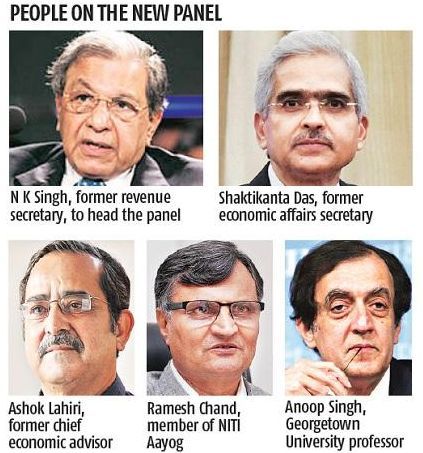The panel will also recommend a fiscal consolidation road map for the central and state governments, study the impact of GST on the divisible pool, and propose performance-based incentives for states.

The government has announced the 15th Finance Commission and it will be chaired by former parliamentarian and revenue and expenditure secretary N K Singh.
Its tenure will be till October 30, 2019, by when it will have to give its final report on distributing divisible funds between the Centre and the states for a five-year period starting April 1, 2020.
The Union Cabinet had approved the setting up of the panel earlier this month.
Apart from recommending the division between the Centre and states, the panel has additional terms of reference.
These include recommending on a fiscal consolidation road map for the Central and state governments, studying the impact of the Goods and Services Tax (GST) on the divisible pool, and proposing performance-based incentives for states, based on fixed parameters.
"The panel shall review the current status of the finance, deficit, debt levels, cash balances and fiscal discipline efforts of the Union and the states, and recommend a fiscal consolidation road map for sound fiscal management. The Commission may also examine whether revenue deficit grants be provided at all,” went the official notification.
It should be noted that another panel headed by N K Singh, the Fiscal Responsibility and Budget Management (FRBM) committee, has already recommended a fiscal road map till 2022-23. That report is being examined by the government.
Additionally, the 15th Finance Commission will be the first such panel to use the 2011 population census.
Till the 14th commission, the 1971 census was used, though it recommended distribution of grants to states for local bodies using the 2011 census.
Apart from Singh, other members include former economic affairs secretary Shaktikanta Das, former chief economic advisor Ashok Lahiri, NITI Aayog member Ramesh Chand, and Georgetown University professor Anoop Singh.
Usually, someone from the erstwhile Planning Commission was named to the panel. In the 14th one, this was Abhijit Sen, a position Ramesh Chand will play in the new body.
“I haven’t gone through the full terms of reference but as far my information goes, I might be tasked to represent the interest of the states in the Commission, something I have been doing in NITI Aayog as well,” Chand told Business Standard.
The 15th panel will study the impact of GST, including payment of compensation for possible loss of revenue for five years, and the abolition of a number of cesses due to the nationwide tax.
The panel will also propose measurable performance-based incentives for states.
These will be based on a number of parameters, including efforts to expand and deepen the tax net, progress in moving towards a replacement rate of population growth, and achievements in implementation of flagship schemes of the government, disaster-resilient infrastructure, sustainable development goals and quality of expenditure.
Other measures are:
- Progress made in increasing capital expenditure,
- Eliminating losses in the power sector,
- Progress in raising tax and non-tax revenues,
- Promoting savings through direct benefit transfers and Public Finance Management Systems,
- Promoting a digital economy and removing layers between the government and beneficiaries, and
- Progress made in promoting ease of doing business, beside labour-intensive growth.
The finance commission is set up every five years to suggest rules to govern the distribution of tax proceeds among Centre, states and local administrative bodies.
The 14th commission was headed by former Reserve Bank of India governor Y V Reddy.
It had recommended the devolution of an unprecedented 42 per cent of the divisible pool to states during 2015-16 to 2019-20, against 32 per cent suggested by the previous commission.
N K Singh: He was a Rajya Sabha MP from 2008-2014, when he was in Nitish Kumar’s Janata Dal (United).
 Now a Bharatiya Janata Party member, he has served as secretary of revenue and expenditure departments in the finance ministry and was an officer on special duty in the Prime Minister’s Office under Atal Bihari Vajpayee.
Now a Bharatiya Janata Party member, he has served as secretary of revenue and expenditure departments in the finance ministry and was an officer on special duty in the Prime Minister’s Office under Atal Bihari Vajpayee.
He was also a member of the erstwhile Planning Commission. Singh also headed the FRBM panel, which has recommended the fiscal road map for the Central government till FY23.
Its report is still being examined by the Centre.
Shaktikanta Das: A veteran economic policymaker and former economic affairs secretary, Shaktikanta Das has helped shape eight Union Budgets - 2017-18 was his last.
A 1980 batch Indian Administrative Service Officer from the Tamil Nadu cadre, he was, in a way, the face of demonetisation, as he used to appear every evening in front of reporters and television cameras to announce the regular changes in rules during November, December 2016.
Ashok Lahiri: He served as chief economic advisor in the finance ministry, serving both the National Democratic Alliance and the United Progressive Alliance-1 governments from 2002 to 2007.
His tenure saw one of the fastest economic growth rates in India.
Later, he served as the executive director, representing India in Asian Development Bank till 2013.
Subsequently, he was part of many committees including the one to interact with the trade and industry on the imposition of excise duty on jewellery.
He is a Business Standard columnist.
Ramesh Chand: He is a member of NITI Aayog, has been involved in policy formulation for the agriculture sector for the past 15 years.
Prior to joining NITI Aayog, he was director at National Institute of Agricultural Economics and Policy Research, New Delhi.
He is also member of the World Economic Forum’s Global Future Council on the Future of Food Security and Agriculture.
Chand has authored seven books and published more than 100 research papers in reputed national and international journals.
Anoop Singh: He was managing director and head of regulatory affairs, Asia Pacific, for JP Morgan during 2014-2015.
Before that, at the International Monetary Fund, he was director of the Asia and Pacific Department (2008-13) and director of the Western Hemisphere Department (2002-08).
Apart from remaining adjunct Professor at the Georgetown University in the US, he has also remained special advisor to the governor of the Reserve Bank of India and senior economic advisor to the vice-president, Asia Region at the World Bank.
Photograph: Thomas White/Reuters












 © 2025
© 2025